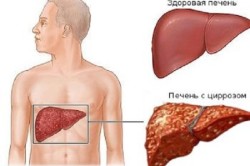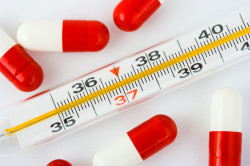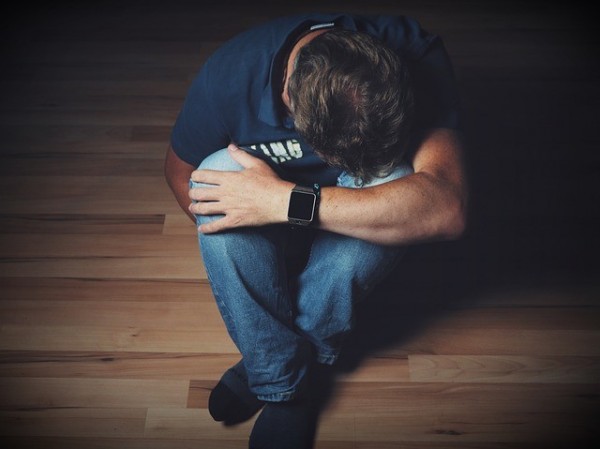There was severe vomiting and diarrhea. Nausea, diarrhea and vomiting in case of poisoning - what to do
Nausea, diarrhea and vomiting in case of poisoning: what to do
Food poisoning without vomiting and diarrhea is extremely rare. Just vomiting and diarrhea are the main symptoms of intoxication.
Nausea in case of poisoning: what to do
Unfortunately, poisoning can happen to anyone, there is no insurance against it. Even if in appearance the food looks quite fresh and edible, this does not mean that an alien, evil bacterium has not started there.
The first symptoms appear within a couple of hours. Therefore, in most cases, the patient immediately calculates what caused the intoxication. The main symptoms include:
- Nausea and vomiting.
- Diarrhea.
- Stomach ache.
- Temperature increase. It doesn't always happen. You can read about what to do, if any, here.
- Weakness.
- Headache.
When the first symptoms are detected, you should try to calculate the toxin. It is necessary to immediately stop its entry into the body. It is imperative to call a doctor. He will examine the patient, correctly diagnose the problem and prescribe a course of treatment. Some illnesses can masquerade as food poisoning, thus wasting precious time for treatment. That is why the help of a doctor is so important. 
What to do if severe vomiting and diarrhea during poisoning
Thus, the body itself tries to throw out the toxin that poisons it. This is a natural reaction, worse when it is not observed.
The main task is to remove toxins. If the patient does not have vomiting, then in most cases they try to induce it. To do this, prepare warm water with soda or potassium permanganate. The patient must drink the "elixir", and then provoke vomiting. The procedure should be carried out until the stomach is clean. It makes sense to carry out manipulation if the poisoning occurred 3-5 hours ago. After that, it makes no sense, because the poisoned food has already been digested.
Diarrhea is also a cleansing of the body. Thus, the intestines throw out the remnants of toxins. In no case should you block diarrhea. It is necessary to relieve the load on the stomach and intestines as much as possible. Therefore, on the first day of poisoning, a head is laid.
If you feel sick after poisoning, then this is absolutely normal. The patient was subjected to serious stress in the form of intoxication, the gastrointestinal tract, liver, and pancreas were overloaded. After the disease, it is worth strictly adhering to a sparing diet until the internal organs recover. About that, you can find here.
What to drink for food poisoning and vomiting
The most the main problem intoxication - dehydration. The body abruptly loses all water reserves, so they need to be restored. Also, the liquid actively helps to cleanse the body of toxins.
The daily norm of drinking liquid is 2 liters. With intoxication, the rate increases. You can only use water without gas. Carbonated liquids will only make it worse, as it negatively affects the stomach and intestines. In no case should you drink milk or decoctions. Only ordinary or mineral water without gas. 
Treating food poisoning at home
If there are no frightening symptoms, then detoxification can be done at home. What to take for food poisoning and vomiting?
The treatment algorithm is as follows:
- Gastric lavage. It was said above that you can use warm water with soda or potassium permanganate.
- Bowel lavage. Carry out an enema if there is no diarrhea. Do not carry out the procedure for young children and pregnant women. Also with caution put an enema to the elderly.
- Plentiful drink. It is necessary to restore the water-alkaline balance. Use non-carbonated water.
- Take sorbent. You can use activated carbon, Sorbex, Atoxil, Smecta. The sorbent will help to quickly remove the toxin from the body.
- In the case of a bacterial infection, an antibacterial agent prescribed by a doctor is used.
- After poisoning, it is advisable to drink a course of probiotics. Bifiform, Laktiale, Linex are often prescribed.
- Rigid diet. The first day you can eat only bagels or crackers. From the next day you can eat lighter food. Prepare vegetable soups. You can eat rice, liquid oatmeal. Exclude all flour, meat, smoked, spicy. The diet is shown for at least 7 days.
This scheme is suitable for mild food intoxications. When the patient has pronounced symptoms, you should immediately consult a doctor. These symptoms include:
- High temperature, which is not knocked down by Paracetamol.
- Loss of consciousness.
- Confused consciousness.
- Strange behavior.
- Seizures.
- A sharp deterioration in well-being after improvement.
These are all signals that a different course of treatment needs to be used. In no case should it be delayed, otherwise serious complications are possible.
In order to avoid food intoxication, you can adhere to preventive measures. You can find out which one is here.
Folk methods
There are many recipes traditional medicine in the treatment of food poisoning. Before using one of them, you need to consult a doctor.
The most common folk methods:
- Frozen mint tea ice cubes can be used to reduce nausea and vomiting. In the intervals between bouts of vomiting, such a cube is sucked.
- Pour salt and a little pepper into a glass of vodka. Drink orange juice.
- A teaspoon of dill seeds is poured with a glass of boiling water and insisted. Drink three times a day for half a cup.
- Squeeze out potato juice. You need to drink half a spoonful before meals.
- In two glasses of cold water, two spoons of trefoil watch insist for eight hours. Drink on the first day of poisoning.
- Four tablespoons of lemon balm are infused in a glass of boiling water. Drink half a glass 4 times a day.
- Take the crushed marshmallow root. A glass needs a spoonful of dry roots. They insist half an hour. Honey is added to the tincture. Drink a spoonful 4 times a day.
- Brewed ginger tea. A glass needs a teaspoon of ginger. Insist 20 minutes. Drink a spoon every hour.
There are a lot of folk recipes, the choice must be approached very carefully. Still, pharmaceutical medicine has long proven its effectiveness. Before using grandmother's recipes, you need to consult a doctor.
Conclusion
Nausea, diarrhea and vomiting are the main symptoms of food intoxication. Unfortunately, poisoning happens quite often, especially during the heat. You need to know how to provide first aid to the victim. The first step is to calculate what led to intoxication. Next is detoxification.
Vomiting and diarrhea are good sign This means that the body is trying to cleanse itself. In no case should you use antiemetics and fixing drugs.
The patient is shown to drink plenty of fluids. As a rule, they drink water without gas. A strict diet is also prescribed, which should facilitate the work of the stomach and intestines.
Be sure to prescribe sorbents to the patient to eliminate toxins. Most often, Smecta, Enterosgel, Activated carbon, Sorbex are prescribed.
In any case, you need to consult a doctor. Only he can correctly diagnose the disease and prescribe the correct treatment. 
Such unpleasant symptoms as vomiting and diarrhea cannot occur without a reason. This is a sign of a serious digestive disorder, and any internal organs can affect this. Sometimes such a reaction of the body can be caused due to side effect for various medications. Against the background of even mild poisoning, there is a feeling of nausea, and then vomiting, and even diarrhea. Thus, the human body tries to quickly remove the infection.
Causes
Known to everyone, such manifestations as vomiting and diarrhea are the body's response to various bacteria, nitrates, toxins, poisons, alcohol, and many others that can seriously harm the health of any person. In addition, acute infections such as dysentery and salmonellosis can cause indigestion.
The first signal of poisoning is nausea, which turns into vomiting and then diarrhea. The reason for this may be the use a large number harmful products, this seriously affects the work of the digestive tract and exhausts the body as a whole. Also, if you eat fried, fatty, smoked, salted foods too often, this will lead to the accumulation of toxins and other harmful substances in the body, since it simply will not have time to get rid of it.
It is not uncommon for the human body to alcohol poisoning, which also causes severe nausea, vomiting and diarrhea.
Quite often, the cause of poisoning is spoiled food and bad water, as a result of which there is an accumulation of toxins and harmful bacteria, after which nausea, diarrhea and vomiting occur, and sometimes even fever. If harmful bacteria enter the human body, the same symptoms appear as with indigestion caused by food.
What to do in case of poisoning
 If there are signs of poisoning, then the first thing to do is to refuse food. In this case, you need to drink more, because the body will lose a lot of fluid. To do this, you can take mineral water, but only without gas, weak tea without sugar, or special restorative drinks bought at a pharmacy. But they must be used, following the instructions in the instructions. And you can also take activated charcoal (calculated as 1 tablet per 10 kg of body weight), smectite and other absorbent drugs.
If there are signs of poisoning, then the first thing to do is to refuse food. In this case, you need to drink more, because the body will lose a lot of fluid. To do this, you can take mineral water, but only without gas, weak tea without sugar, or special restorative drinks bought at a pharmacy. But they must be used, following the instructions in the instructions. And you can also take activated charcoal (calculated as 1 tablet per 10 kg of body weight), smectite and other absorbent drugs.
If vomiting does not stop, then it is better to drink antiemetic medicine. If the poisoning has arisen due to pathogenic microbes, appropriate drugs will be required. When the general condition of the body does not improve, but on the contrary, there is constant vomiting and a violation of the feces, emergency care should be called. You will also need medical assistance if there are cramps in the abdomen in addition to fever, then in no case should you self-medicate.
In any case, poisoning reaches a serious stage if severe nausea and vomiting is accompanied by a violation of the stool. In such a situation, it is better to call a local doctor or an ambulance.
When, in addition to diarrhea and vomiting, there is severe fatigue with weakness and high temperature and even dizziness, you can’t do without an ambulance either.
Because with these signs, there is a high probability that a violation of the vegetative system has occurred. In a situation where the head is spinning, but there is no elevated temperature, this becomes a consequence of the occurrence of vegetative-vascular dystonia. But if no deviations are found after measuring the pressure, then the cause may be severe stress or a panic that has arisen, and here it is worth calming down and taking sedatives in the form of drops or tablets. But only a specialist can prescribe the right treatment.
If the temperature during poisoning does not exceed 37 ° C, but there is slight weakness with vomiting and diarrhea, then in most cases this indicates food poisoning. In this case, you need to immediately rinse the stomach, and then take the sorbents. When available severe vomiting, you need to drink as much as possible, as the body is severely dehydrated.
What to do after poisoning
 When the vomiting has stopped, the feeling of nausea has disappeared, and the feces have recovered, you can start a good diet. But at the same time, you need to stick to a diet. In the first 24 hours, it is allowed to eat oatmeal boiled in water, rice, and lean bread or a roll. You also need to drink a lot, uzvar, rosehip tea or dried fruit compote is best for this, but all this is without sugar. You can not eat fruits, smoked meats, milk and dairy products, meat and sweets.
When the vomiting has stopped, the feeling of nausea has disappeared, and the feces have recovered, you can start a good diet. But at the same time, you need to stick to a diet. In the first 24 hours, it is allowed to eat oatmeal boiled in water, rice, and lean bread or a roll. You also need to drink a lot, uzvar, rosehip tea or dried fruit compote is best for this, but all this is without sugar. You can not eat fruits, smoked meats, milk and dairy products, meat and sweets.
On the second day, you can include all cereals in the diet with the addition of a small amount of diluted with boiled water milk, and vegetables. You can return to normal food only on the third day, but everything should be in moderation. If you were taking antibiotics, then you need to drink them for at least two to three days, but only if the symptoms of poisoning no longer appear. Only when complete recovery occurs and good health returns, you can stop taking medication.
After the antibiotics are finished, it is necessary to restore the microflora of the body. And you need to start taking such medications as soon as the stool normalizes. This will help restore efficiency and improve digestion.
Consequences after suffering poisoning and possible diseases
 Symptoms of poisoning can be the cause of diseases of internal organs, various infections in the body, pathologies and tumors. In the last two cases, the symptoms of poisoning are accompanying, and cannot be complete picture diseases, the treatment of which has its own characteristics. But when making a diagnosis, first of all, you need to pay attention to the pathology of the stomach and intestines.
Symptoms of poisoning can be the cause of diseases of internal organs, various infections in the body, pathologies and tumors. In the last two cases, the symptoms of poisoning are accompanying, and cannot be complete picture diseases, the treatment of which has its own characteristics. But when making a diagnosis, first of all, you need to pay attention to the pathology of the stomach and intestines.
If diarrhea appears along with vomiting, then a lot of fluid is lost into the body, dehydration and a violation of the water-salt balance occur. As a result, the heart, kidneys suffer and brain function is disrupted.
Types of diseases that are accompanied by nausea, vomiting and diarrhea are classified into the following categories.
The most common cause of nausea is food poisoning. This type also includes poisoning. alcoholic drinks.
The second type of pathogen includes an infection in which vomiting and defecation disorders occur.
Symptoms of poisoning can also occur as a result of a violation of the nervous system. Many experts argue that a large part of the resulting poisoning appears due to nervous breakdowns. daily problems, constant fatigue, lack of sleep, are among the main causes of nausea, vomiting and indigestion, kidney, heart and liver diseases.
Also, poisoning can occur as an adverse reaction to various medications and poor ecology, and more.
There are a number of diseases of the digestive system that cause diarrhea and vomiting. For example: hepatitis, gastritis, stomach ulcers of varying degrees.
Prevention measures
Vomiting and diarrhea are symptoms of many diseases, but we will focus only on the most common, without touching oncology, dysentery disorders or cholera. It's about about poisoning.
These two symptoms usually come in pairs, one almost never occurs without the other. Vomiting, diarrhea are characterized by the fact that they are not amenable to almost no control during the course. But here the correct treatment can "pacify" them. The fact is that prolonged vomiting and diarrhea, even separately, are very dangerous for health, as they lead to disturbances in the field of water-salt balance and the body begins to experience electrolyte shock, which disrupts the activity of all systems.
The main reason for these symptoms is as follows. Microbes enter the gastrointestinal tract, which not only begin to multiply rapidly, but also carry out their "life activity". The decay products and their excrement begin to poison the body, resulting in diarrhea and vomiting.
It is recommended to urgently call a doctor, and not self-medicate, and control the condition in order to avoid dehydration, since this process can occur very quickly. In addition, a number of principles must be observed.
First rule. It is obligatory to refrain from eating for at least eight hours. You can not make snacks, drink juice and so on. But during this period of time it is recommended to drink. Most best options for this - mineral water without gas, the drug "Regidron", a decoction of dried fruits and unsweetened jelly. Drinks should be taken frequently (every 10 minutes), but in small portions(several teaspoons). Even if vomiting and diarrhea have stopped, the "starvation diet" should not be stopped in any case before the end of 8 hours.
Third rule. In the event that vomiting and diarrhea continue for more than a day, then you need to start taking antimicrobial drugs (for example, Enterofuril, Ersefuril, and so on). In the event that another day has passed, and there is no improvement in the condition, it is recommended to switch to antibiotics. The most effective and traditional remedy is chloramphenicol. The dosage is recommended to be selected individually and in accordance with the instructions.
Fourth rule. If vomiting does not stop, or if there is a constant urge for it, then it is better to take, for example, Motilium.
Sooner or later the vomiting and diarrhea will stop. But most importantly, avoid re-disorder of the body. To do this, it is recommended to follow a certain diet when leaving the "hunger diet".
First day. Start eating in small portions, and only the following foods: oatmeal porridge on the water, homemade crackers and rice water. As drinks, preference is given to unsweetened rosehip broth and tea without sugar.
Second day. You can start eating cereals cooked in a ratio of 1: 1 (water-milk). The main thing is not to take sweet foods, because sugar causes fermentation in the body and contributes to the development and reproduction of microorganisms.
The third day. You can eat meat. In this capacity, use the broth with boiled breast, or mashed potatoes without oil with cranked chicken.
All these days it is recommended to take enzymes and beneficial bacteria in medicines, and with fourth day start drinking fermented milk products, as they contain microorganisms necessary for the restoration of the gastrointestinal tract.
Vomiting is a reflex eruption through the mouth of the contents of the stomach, and sometimes the duodenum. By its very nature, vomiting is a mechanism by which the body defends itself against poisoning. Normally, vomiting is a reaction to the ingestion of toxic substances into the gastrointestinal tract or simply something that cannot be digested - for example, too fatty foods. Therefore, after an attack of vomiting, a person often feels relieved: the body has cleansed itself.
Quite often, diarrhea and vomiting are observed against the background of abdominal pain. In this case, the cause may be gastritis, stomach or duodenal ulcer, cholecystitis, pancreatitis, chronic hepatitis.
If diarrhea and vomiting are accompanied by weakness and dizziness, then the cause may be vegetative-vascular dystonia. Similar symptoms may also be psychogenic in origin (for example, with panic attack when a person convinces himself that his condition indicates an imminent death).
What to do with diarrhea and vomiting
If the diarrhea and vomiting is a reaction to poor-quality food or is caused by a rotavirus infection, try to manage the problem by observing the following rules:
- do not try to immediately stop the diarrhea and do not hold back bouts of vomiting - let the body cleanse itself. As a rule, one day is enough for this;
- with diarrhea and vomiting, dehydration occurs. Therefore, it is necessary to drink, best of all mineral alkaline water. With severe diarrhea, it is advisable to use solutions of special preparations that maintain the necessary water-salt balance in the body ("Regidron", etc.);
- but there is, on the contrary, it is not necessary;
- to bind toxins, you can take sorbents - drugs that bind and remove harmful substances from the body (activated carbon, etc.).
When to See a Doctor for Diarrhea and Vomiting
If diarrhea and vomiting are caused by accidental poisoning, and you managed to deal with them using the tactics described above, there is no cause for concern. However, in case of diarrhea and vomiting, it is still better to see a doctor and undergo an examination - if the symptoms were caused by a rotavirus infection, you need to make sure that the body has coped with the disease and there are no complications. It is also necessary to exclude (or start treatment) a chronic disease, the exacerbation of which could cause diarrhea and vomiting.
Be sure to consult a doctor in case of diarrhea and vomiting in a small child.
If symptoms persist for more than a day or if the condition worsens (especially against the background of fever), emergency medical attention should be called.
- What are intestinal infections and what causes them
- Some Features
- Treatment of intestinal infections
Signs such as vomiting and diarrhea are very often symptoms of many serious illnesses. At the same time, there is often an increase in temperature, headache, nausea, constant malaise, general weakness and chills. With such manifestations, in no case should the situation be left to chance.
Such signs in any scenario, regardless of what functional disorders they are caused, lead primarily to dehydration of the entire body, which is deadly for humans.
Most often, the combination of these symptoms gives every reason to assume the presence of an intestinal infection, food poisoning, or general intoxication of the body. However, there are cases when manifestations indicate more serious illnesses: hepatitis, hepatic cirrhosis, gastritis, functional disorders gastrointestinal tract, colitis, peptic ulcer of the stomach or duodenum, pancreatitis, botulism and so on.
Diarrhea can appear as a result of individual intolerance to medications, as well as be a kind of reaction to certain foods or stressful situations. However, the most common combination of diarrhea and vomiting is still observed in the presence of intestinal infections.
What are intestinal infections and what causes them
 Symptoms such as vomiting, diarrhea, and fever are indicative of a gastrointestinal infection. There are many reasons why they enter the human body. Among them, food and other poisonings of the body and a wide variety of viral and bacterial infections. Vomiting and diarrhea in an adult is manifested in exactly the same way as in a child. Tolerability of diseases largely depends on individual features specific patient.
Symptoms such as vomiting, diarrhea, and fever are indicative of a gastrointestinal infection. There are many reasons why they enter the human body. Among them, food and other poisonings of the body and a wide variety of viral and bacterial infections. Vomiting and diarrhea in an adult is manifested in exactly the same way as in a child. Tolerability of diseases largely depends on individual features specific patient.
Quite often, infection occurs through the fault of the victim himself. Such consequences are caused by uncleanliness, ignoring elementary hygiene rules, eating undercooked meat or fish dishes, unwashed fruits, food spoiled by improper storage or expired. Bacteria in the human body similar actions respond with increased production of toxins that act on it like a poison. Each poisoning can proceed differently, it depends on the type of bacteria and their number. However, it is worth noting that the symptoms of various intestinal infections have many common features, and only an experienced specialist can accurately diagnose by identifying the root cause of the disease.
In the case when patients are dealing with a toxicogenic staphylococcal infection, it is possible to get rid of severe manifestations after a day after the start of treatment. Although bacteria of this type cause the most powerful poisoning, in which symptoms such as:

- heat;
- persistent diarrhea;
- nausea and diarrhea, vomiting.
The most dangerous are those products that can be classified as perishable: meat products, seafood, fish, milk and dairy products. Moreover, people who deal with food can be carriers of infections, especially if they themselves get tonsillitis or tonsillitis.
Staphylococcal bacterium has the ability to survive in any conditions and does not disappear even after boiling or heat treatment of food. For this reason, when spoiled, it is better to throw them away so as not to catch an intestinal infection.
Back to index
Some Features
The causes of vomiting and diarrhea can be hidden in the ingestion of salmonellosis bacteria in the human body. Salmonella is found in meat or eggs, or is passed on from direct contact with a sick person. As for dysentery, only a person can be the source of infection here. Both diseases are accompanied by paroxysmal vomiting and diarrhea, sometimes with bloody discharge, colic in the abdomen, fever, weakness, chills and general malaise. In terms of numbers, the number of people suffering from dysentery is several times higher than those suffering from salmonellosis.
 Diarrhea and vomiting are companions rotavirus infection. Although visible signs diseases are initially similar to the diseases described above, and a cough with a runny nose is later added to this ailment. Transmission of infection is carried out mainly by airborne droplets with direct contact.
Diarrhea and vomiting are companions rotavirus infection. Although visible signs diseases are initially similar to the diseases described above, and a cough with a runny nose is later added to this ailment. Transmission of infection is carried out mainly by airborne droplets with direct contact.
There are also cases in medical practice of infection with more dangerous viruses that can cause intestinal upset. For example, cholera vibrio leads to shock and death. It is possible to become infected with it when bathing in reservoirs or through ordinary tap water that has not been boiled. Similar consequences are caused by a disease such as botulism, which occurs when the rules are not followed during canning and smoking, which most often occurs at the household level.
Back to index
Treatment of intestinal infections
Self-treatment is possible only if the disease is mild.
If any poisoning with severe intoxication occurs, especially if the child vomits, you should immediately call ambulance. Usually, in case of poisoning, it is allowed to take activated carbon, smecta, rehydron, various sorbents or polyfipan.
With diarrhea, it is immediately desirable to take sulfasalazine, levomecithin or diclofenac. Each diarrhea remedy named has the ability to reduce the amount of mucus in the intestines. Before the ambulance arrives, it is recommended to do gastric lavage with a weak solution of manganese with water. This is especially true for children, since the child is likely to need the help of adults.
If the body temperature rises to 38.5 °, it is not necessary to bring it down, as this is a sign that the body is actively fighting the infection. The best option would be to wait for the doctor and strictly follow his recommendations. In addition, when the temperature is down, the clinical picture of the patient's condition is somewhat distorted, which threatens to untimely clarify the diagnosis and prescribe the wrong treatment. If the temperature is too high and rises quickly, then the heat must be removed. The patient can be given paracetamol, citramon, analgin, nimesil, ibuprofen, indomethacin, aspirin, and so on. The attending physician must be informed about all previously taken drugs and actions performed.
Usually with similar manifestations, but different diseases, patients have absolutely no appetite. During such periods, it is better not to force the body to take food. The main rule in this situation is sufficient fluid intake.
Further, according to many doctors, it is advisable to prescribe a remedy such as festal, which is produced on the basis of pancreatin enzymes. Some time after giving first aid, it will be possible to take antidiarrheal drugs, for example, lopedium and tincture from oak bark. Chamomile tea also does not hurt and relieve inflammation. During treatment, patients are usually prescribed a sparing diet therapy, which excludes the use of fatty, fried, salty foods, smoked meats, alcohol, flour products, sweets, coffee, strong tea, chocolate, spices and heavy food. It is allowed to cook steam cutlets, mashed potatoes and cereals on water, light vegetable soups and soufflé. In some cases, antibiotics may be prescribed by a doctor.
It is strictly forbidden to engage in self-medication in case of poisoning, since instead of benefit, there is a possibility of harming the body, further aggravating the situation. This is especially true for ailments in children.







